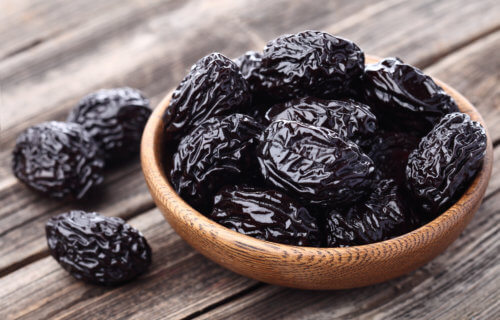ROSEVILLE, Calif. — Add prunes to your list of go-to snacks. A new study finds munching on the healthy snack may help prevent bone loss and maintain good bone health — especially for older women. Researchers from Pennsylvania State University found that prunes can dampen a high inflammatory response that hurts bone density and strength among postmenopausal women.
“Our findings demonstrate that inflammatory markers are negatively associated with bone health in postmenopausal women, suggesting that inflammation might be an important mediator for postmenopausal bone loss and a potential target for nutritional therapies,” explains study author Connie Rogers, PhD, MPH, professor and head of the department of Nutritional Sciences at University of Georgia, in a media release.
Over 10 million adults over 50 have osteoporosis. Women are four times more likely to develop osteoporosis than men. One of the reasons behind the increased risk is the sharp drop in estrogen when women enter menopause. Along with a loss of estrogen comes a loss of trabecular (the spongy, honeycomb shaped interior core) and cortical bone (strong exterior of the bone) density. The relationship between estrogen and bone loss comes down to the inflammation seen in people with estrogen deficiency. A rising inflammatory response can result in destruction of bone tissue and a suppression of bone formation.
“Evidence from several observational studies suggests a link between chronic inflammation and osteoporosis and fracture risk. Looking at postmenopausal women, we began our research by exploring the relationship between biomarkers of inflammation and bone. This helped us establish a baseline prior to a dietary intervention with prunes,” says Rogers.
How many prunes does it take to prevent bone loss?
The research team had menopausal women eat either five to six prunes a day or 10 to 12 prunes a day for one year. At the same time, researchers checked their bone mineral density, bone geometry, and estimated bone strength. There was also a pooled group that ate a mixture between five to twelve prunes daily.
“Previously, we demonstrated that consuming 5-6 prunes a day for 12 months resulted in preservation of bone at the total hip, a finding that was observable at six months and persisted through month 12. In this second part of the randomized controlled trial, 3-D imaging of bone provided some additional info about the response of bone to consuming prunes daily,” says Mary Jane De Souza, PhD, FACSM, a distinguished professor and director of The Women’s Health and Exercise Lab in Pennsylvania State University, who served as principal investigator of the trial.
When women had their bones tested with weight-bearing tibial sites after 12 months, they found that having prunes as part of their regular diet made a difference in preserving bone mineral density compared to the control group.
“We observed that the pooled group of women experienced some bone benefits. In particular, estimated bone strength at the tibia was maintained in the pooled group and cortical volumetric bone density was maintained in the 5-6 prunes a day and 10-12 prunes a day groups. As such, it appears that prunes may help prevent bone loss, especially at the hip and tibia,” De Souza concludes.
The study authors presented their findings at the North American Menopause Society Annual Meeting.

